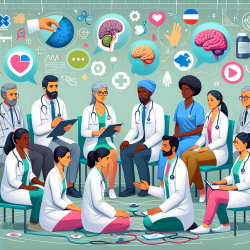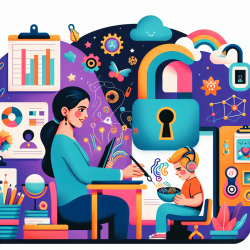Introduction
In the ever-evolving field of psychiatry, healthcare professionals must continuously hone their skills to provide the best care for patients. A recent systematic review titled "Effectiveness of simulation in psychiatry for initial and continuing training of healthcare professionals" offers valuable insights into the use of simulation as a training tool. This blog post will explore how practitioners can implement the findings of this research to enhance their skills and encourage further exploration in this area.
The Power of Simulation in Psychiatry
Simulation training has long been recognized as a powerful pedagogical tool across various medical specialties. In psychiatry, simulation offers a unique opportunity to practice and refine skills in a controlled, risk-free environment. The research highlights several key benefits of simulation training:
- Improved Communication Skills: Simulation allows practitioners to engage in realistic patient interactions, enhancing their ability to communicate effectively with individuals experiencing mental health issues.
- Enhanced Clinical Reasoning: By simulating complex psychiatric scenarios, healthcare professionals can develop critical thinking and decision-making skills essential for accurate diagnosis and treatment planning.
- Increased Confidence: Practicing in a simulated environment boosts confidence, enabling practitioners to approach real-life situations with greater assurance.
Implementing Simulation Training
To maximize the benefits of simulation training, practitioners should consider the following strategies:
- Incorporate Diverse Scenarios: Utilize a variety of simulation techniques, such as role-playing with standardized patients, virtual reality, and manikins, to cover a wide range of psychiatric conditions and situations.
- Provide Constructive Feedback: Feedback is crucial for learning. Ensure that simulations include opportunities for self-reflection and feedback from peers and instructors to reinforce learning and identify areas for improvement.
- Integrate Simulation into Continuous Education: Simulation should not be a one-time event. Incorporate it into ongoing training programs to keep skills sharp and up-to-date with the latest practices and guidelines.
Encouraging Further Research
While the systematic review provides a comprehensive overview of the effectiveness of simulation in psychiatry, there is always room for further exploration. Practitioners are encouraged to engage in research to:
- Explore New Technologies: With advancements in virtual reality and artificial intelligence, new simulation tools are emerging. Investigate how these technologies can be integrated into psychiatric training for enhanced learning experiences.
- Assess Long-term Impact: Conduct longitudinal studies to evaluate the long-term effects of simulation training on clinical practice and patient outcomes.
- Tailor Training to Specific Needs: Research can help identify the most effective simulation techniques for different psychiatric specialties and patient populations, allowing for more personalized training programs.
Conclusion
Simulation training is a valuable tool for enhancing the skills of healthcare professionals in psychiatry. By implementing the findings of the systematic review and engaging in further research, practitioners can improve their ability to provide high-quality care to patients with mental health issues. For those interested in delving deeper into the research, the original paper can be accessed here: Effectiveness of simulation in psychiatry for initial and continuing training of healthcare professionals: protocol for a systematic review.










